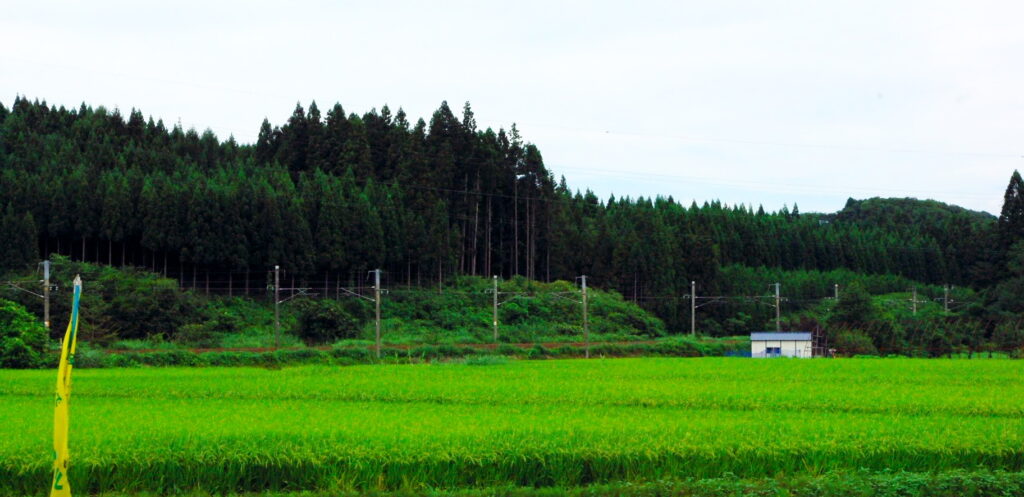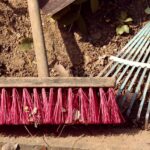
Land of Premium Timber
My home prefecture, Akita, is renowned nationwide as the birthplace of “Akita cedar” among the many woods classified as fine timber, and its beautiful grain has always been extremely popular for traditional Japanese-style interiors. I once read that the cedar so common in the Kanto region was planted after wartime fires destroyed the original forests, but in Akita almost every mountain is still covered in cedar—the very wood I was familiar with from childhood.
Even though I’ve now lived in the Kanto region for longer than I ever did in Akita, I’ve ironically come to suffer from cedar pollen allergies—something that makes me almost ashamed in front of my fellow Akita folks!
(As an aside, there used to be a small izakaya about a five-minute walk from Shinjuku-Sanchome Station that specialized in Akita sake. The owner was an Akita beauty—just the right image for someone from Noshiro—and she was helped in the kitchen by students from Akita. Even in the heart of the city, the place felt like a little piece of Akita. The counter was made from a single slab of Akita cedar, its surface so smooth and the annual rings so striking. I can still recall how impressed I was when I spilled sake on it in my inebriated state, only to see the water bead up on the wood. (Sadly, that restaurant has since closed.)
Timber Merchants of Shin-Kiba
One of the industries I was assigned to investigate was timber wholesale. Like textiles, this traditional industry relied heavily on specialized credit–investigation firms, underscoring how vital information networks are in this field*. When I shared intelligence gleaned from one lumber wholesaler with another, they were always grateful—being an “information merchant” in that industry was incredibly rewarding.
Most of the timber merchants, especially those dealing in building materials traded on the First Section of the Tokyo Stock Exchange, had their headquarters around Shin-Kiba. I visited them over and over—some were trying to break industry conventions by specializing in imported timber, while more established firms shunned imports entirely. Others, upon the succession of a third-generation president, diversified into custom homebuilding. There are also timber businesses sprinkled throughout Fukagawa and Tomioka, but it’s rare to see so many companies in the same trade clustered so tightly in one neighborhood.
*Rengo Investigation. Bankrupt in 2019.
Akita-ya
Around 2010 or just before, there was a firm in the Kiba area called Akita-ya—specialists in the very Akita cedar I introduced at the start—and their business cards proudly bore the Akita-ya name. Sadly, Akita-ya seems to have disappeared altogether, though one of those firms was fortunate enough to become my client.
“Why don’t you ask Rengo?”
That brusque reply was how the elderly president answered my first call requesting an investigation. But craftsmen can be a bit rough around the edges, so I began my relationship with Akita-ya by simply delivering my business card in person.
“I’m from a credit–investigation company. You turned me down over the phone, but I just wanted to drop off my card.”
His face softened when he heard I was also from Akita, that I’d grown up with cedar, and that I’d been surprised when I went to Chiba for university and saw so few cedar trees.
Second Survey
Less than six months after the initial investigation, another request came in: the client wanted to reassess Akita-ya’s current situation. If business is operating normally, clients rarely commission repeat investigations—this made my heart sink.
“We’ve got a credit–survey request. I’d like to meet with the president again.”
A female staff member answered: “I’m not sure when he’ll be in. Could you just drop by when it’s convenient?”
When I visited the next day, I found him wearing his customary Akita-ya happi coat—but he looked terribly thin and distinctly unwell.
“Oh, you’re back.”
The interview lasted maybe thirty minutes. He told me how he’d come to succeed the business, about the challenges posed by imported timber flooding the market, and other details—I can’t even recall them now, because the image of him coughing into his teacup stuck with me.
“This is bad.”
Worried that his poor health might spell trouble for the company’s finances, I sought to corroborate my hunch by interviewing one of his suppliers back in Akita Prefecture.
“Hello, this is Nakamura in Tokyo doing a credit survey. Do you do business with the Akita-ya over at Kiba?”
“Oh, you mean the one our Tokyo branch’s Mr. Sato asked you to look into? Yeah, we’re their biggest account.”
Because credit investigators don’t always know who their client is, that kind of mix-up can happen.
“We feel safe relying on them, since our head clerk knows them well.”
“Understood—thanks for confirming.”
In the end, I judged the company to be in normal operating condition and summarized my report accordingly.
Closure
Then, not long after, a third investigation was requested.
I called to set up the usual interview—and this time the person who picked up said:
“The president has passed away.”
“Oh… I’m very sorry to hear that.”
In most companies, you’d offer your condolences and end the call. But I had a duty to report the situation to my client, so I asked:
“Will the head clerk take over the business?”
“Hold on a moment… I’ll transfer you to the daughter.”
The “female staff member” from before was indeed the late president’s daughter and was now running the business.
“I helped my father with the bookkeeping, but I don’t know much about timber. After talking it over with the head clerk, we’ve decided to stop dealing in wood. We’ll continue managing the several apartment buildings we own.”
And so, Kiba’s Akita-ya drew down its shutters on its timber business.
When I updated the industry code in my report—from “Timber Wholesale” to “Real Estate Rental”—I thought I caught a faint scent of Akita cedar one last time.



